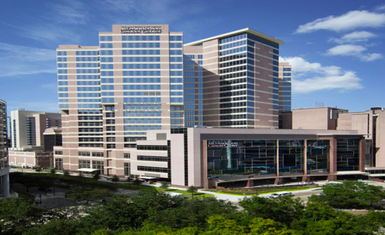MD Anderson receives over $10 million from Break Through Cancer to support collaborative research with leading cancer centers
Funding is part of $50 million in grants to teams at five cancer centers charged to work together
| Contact: Clayton Boldt, Ph.D. | Office: 713-792-9518 | Cell: 409-673-5582 | crboldt@mdanderson.org |
HOUSTON ― The University of Texas MD Anderson Cancer Center was awarded more than $10 million in grants to support collaborative research teams working to advance novel interception and treatment strategies that will improve outcomes for several cancer types with the greatest unmet need, including pancreatic cancer, ovarian cancer and glioblastoma (GBM).
Funded by Break Through Cancer, this work is part of $50 million in grants being made to teams across five cancer research centers: MD Anderson, Dana-Farber Cancer Institute, The Sidney Kimmel Comprehensive Cancer Center at Johns Hopkins, Memorial Sloan Kettering Cancer Center, and Koch Institute for Integrative Cancer Research at MIT.
This new model for collaboration enables researchers to boldly tackle some of the biggest challenges in cancer. Break Through Cancer’s innovative approach will help overcome conventional barriers to multi-institution teamwork by using streamlined processes and systems for more effective data collaborations.
Giulio Draetta, M.D., Ph.D., MD Anderson’s chief scientific officer, and David Jaffray, Ph.D., MD Anderson’s chief technology and digital officer, serve as members of the Break Through Cancer Board of Directors.
“Collaborative team science is the cornerstone of our work at MD Anderson, with the goal of advancing breakthroughs that can improve patients’ lives. We also know that, to make real progress, our research cannot stand alone,” Draetta said. “Break Through Cancer’s unique approach unites some of the greatest minds in cancer research to better understand disease mechanisms underlying currently intractable cancers. Through this work, we hope to drive real impact and innovation.”
All projects funded by Break Through Cancer will use a model that allows researchers and physicians from each institution to work collaboratively in real time. Additionally, new technology and systems will make data collaborations frictionless. Reducing the day-to-day barriers to cross-institutional collaboration, such as contract negotiations, data access, intellectual property management and authorship rights, will pave the way for faster discoveries.
Together with Jaffray, Caroline Chung, M.D., MD Anderson’s chief data officer, has worked closely with Break Through Cancer to coordinate our approach to data. In partnership with Break Through Cancer’s growing multi-institutional data science team, Chung has shaped the interface between data governance and data science to enable seamless collaborations across institutions and domains — basic science, clinical research and data science — to make transformative advances in cancer.
“New models and infrastructure are essential to enable the seamless collaboration required for an effort of this significance,” Jaffray said. “Our work will allow researchers across the country to collaborate as if they are standing shoulder to shoulder, transforming the team science process so we can accelerate meaningful progress.”
Projects have been funded based on their unique cohort of researchers and potentially transformational science. The projects and faculty researchers include:
- Intercepting Ovarian Cancer – Barrett Lawson, M.D., Karen Lu, M.D., Larissa Meyer, M.D., and Linghua Wang, M.D., Ph.D.
- Targeting Minimal Residual Disease in Ovarian Cancer – Tyler Hillman, M.D., Ph.D., Amir Jazaeri, M.D., Karen Lu, M.D., Linghua Wang, M.D., Ph.D. and Shannon Westin, M.D.
- Conquering KRAS in Pancreatic Cancer (in partnership with the Lustgarten Foundation) – Ronald DePinho, M.D., Timothy Heffernan, Ph.D., Raghu Kalluri, M.D., Ph.D., Anirban Maitra, M.B.B.S., Shubham Pant, M.D., and Linghua Wang, M.D., Ph.D.
- Revolutionizing GBM Drug Development Through Serial Biopsies – Kadir Akdemir, Ph.D., Sangeeta Goswami, M.D., Ph.D., Jian Hu, Ph.D., Jason Huse, M.D., Ph.D., Wen Jiang, M.D., Ph.D., Betty Kim, M.D., Ph.D., Frederick Lang, M.D., Vinay Puduvalli, M.D., Padmanee Sharma, M.D., Ph.D., Shiao-Pei Weathers, M.D., and Ying Yuan, Ph.D.
“We are honored to be part of this united effort that aligns so well with our mission to end cancer,” said Peter WT Pisters, M.D., president of MD Anderson. “This tremendous support from Break Through Cancer will stimulate compelling projects being led by many of the top minds across the country, and we look forward to seeing impactful results.”
– 30 –
| About MD Anderson
The University of Texas MD Anderson Cancer Center in Houston ranks as one of the world’s most respected centers focused on cancer patient care, research, education and prevention. The institution’s sole mission is to end cancer for patients and their families around the world. MD Anderson is one of only 51 comprehensive cancer centers designated by the National Cancer Institute (NCI). MD Anderson is No. 1 for cancer in U.S. News & World Report’s “Best Hospitals” rankings. It has been named one of the nation’s top two hospitals for cancer since the rankings began in 1990. MD Anderson receives a cancer center support grant from the NCI of the National Institutes of Health (P30 CA016672). |
© 2022 The University of Texas MD Anderson Cancer Center


